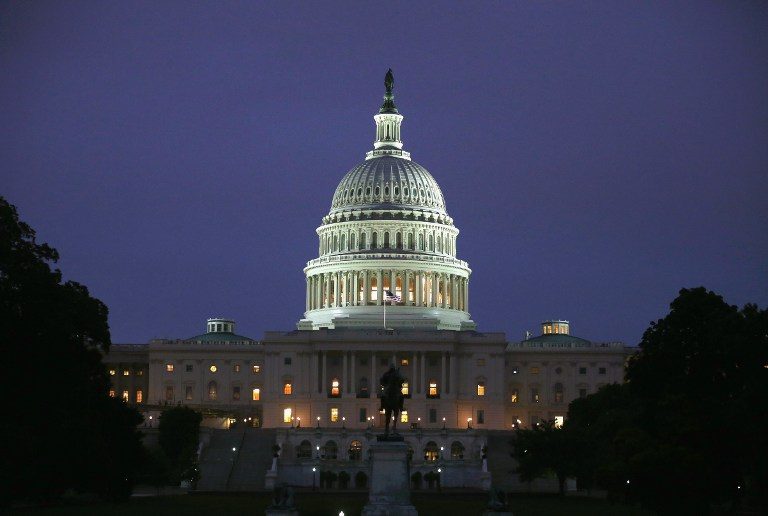SUMMARY
This is AI generated summarization, which may have errors. For context, always refer to the full article.

WASHINGTON DC, USA (UPDATED) – The US Senate narrowly approved a sweeping tax overhaul early Wednesday, December 20, putting President Donald Trump on the brink of his first major legislative triumph nearly a year after he took office.
Hours earlier, Trump’s $1.5 trillion deficit-busting tax cuts cleared the House of Representatives, but a rare last-minute snag over parliamentary rules will force the lower chamber to vote on the updated package once again Wednesday.
The deepest rewrite of the US tax code in 3 decades provides dramatic tax breaks to corporations, and families at all incomes levels will see their income tax drop starting next year, with the largest benefits going to the wealthy.
The Republican legislation passed the Senate along strict party lines, 51 votes to 48, with all Democrats united in opposition.
The vote had appeared destined to a dramatic showdown, especially with Senator John McCain’s absence due to cancer treatment meaning Republicans could afford only one defector.
Vice President Mike Pence presided over the chamber in the event he need to break a tie.
But with senators Marco Rubio and Bob Corker backing off their threats to oppose the bill, it ultimately carried through, and Pence pronounced to loud cheers, “the Tax Cuts and Jobs Act is passed.”
In the House, 12 Republicans had joined all Democrats in opposition as the bill passed 227 to 203.
“Today we are giving the people of this country their money back,” said House Speaker Paul Ryan, who forcefully banged the gavel down as he proclaimed victory.
Trump, who has pushed hard to get the measure across the finish line, noted on Twitter that the bill bounces back to the House, and that if the chamber signs off on the minor changes, as expected, there will be a White House news conference Wednesday at about 1:00 pm (1800 GMT).
Crucial win
Senate Democrats said they demanded that 3 provisions in the bill – including one allowing the use of savings accounts for home-schooling expenses – be stripped out because they violate the Senate’s so-called Byrd Rule, guidelines on the kinds of legislation that can pass the Senate with just a simple majority.
Democrats seized on the hiccup as proof that Republicans were rushing to jam the tax cuts through Congress without enough study.
Republican leaders unveiled their final version of the bill only late last week, and Trump has demanded it reach his desk by Christmas.
Should the bill become law, it would be the Republicans’ most important legislative victory in the 11 months since Trump’s inauguration.
The Republican plan is projected to add nearly $1.5 trillion to the national debt over the coming decade, according to the Joint Committee on Taxation.
That figure drops to about $1 trillion when economic growth is accounted for.
Ryan stated that a median-income family of 4 earning $73,000 annually would save $2,059 in taxes next year.
‘Moral obscenity’
The Democratic opposition has denounced the measure as mostly benefiting companies and the wealthiest Americans – including Trump himself – and warns it risks blowing a hole in the national debt, which has surged past $20 trillion.
Top House Democrat Nancy Pelosi called the bill a “moral obscenity.”
Under the legislation, the federal corporate tax rate would fall from 35% to 21%, and the maximum individual income tax rate, for the nation’s wealthiest, would drop from 39.6% to 37%.
“Every fundraiser, every fat check from a billionaire, and every champagne and caviar party has been about getting to this day, the day when the politicians they put in charge of Washington would pay them back with a $1.5 trillion giveaway,” said firebrand liberal Senator Elizabeth Warren.
While Republicans failed earlier this year to repeal and replace Obamacare, the tax plan takes a key step in that regard, by scrapping the individual mandate that requires nearly all Americans to have health insurance or pay a fine.
Polls show a majority of Americans are opposed to the tax bill, but Republicans brushed aside suggestions that public opposition to the reforms will hurt their party in next year’s mid-term elections.
“That’s an argument we’re more than happy to have” heading into 2018, a clearly elated McConnell told reporters after what many Republicans called the “historic” vote.
“If we can’t sell this to the American people we ought to go into another line of work,” he added. – Rappler.com
Add a comment
How does this make you feel?


![[WATCH] Try This: Empanada Salteña from Argentina](https://www.rappler.com/tachyon/2023/04/try-this-empanada-saltena-argentina.jpg?resize=257%2C257&crop=765px%2C0px%2C1037px%2C1037px)


There are no comments yet. Add your comment to start the conversation.